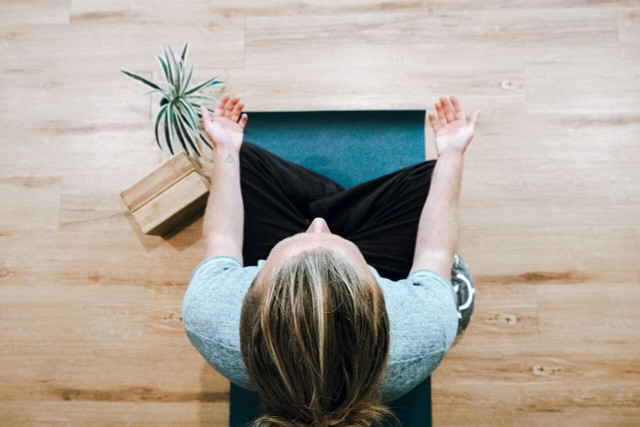Did you know that nose breathing is healthier than mouth breathing? There are many health benefits associated with nasal breathing. Here's the lowdown.
We may only think consciously about breathing when we have a cold or stuffy nose and are struggling to breathe through our nose. Usually, nose breathing is effortless, and we do it constantly without thinking about it. Many of us only resort to mouth breathing when our nose is blocked if we’re sick or when we’re exercising.
But did you know that many people breathe through their mouths, often without realizing it? It may be a bad habit they have picked up from childhood, or perhaps they just find it more comfortable due to nasal problems. But mouth breathing can be bad for your health. This article will discuss nose breathing benefits and the science behind why nose breathing is better for you. Let’s get started.
The Difference Between Mouth and Nose Breathing

(Foto: CC0 / Unsplash / Gregory Pappas)
Our mouth helps us to eat, drink and talk, but our nose is specifically “designed” for breathing. When we breathe through our nose, the hairs in our nostrils help to filter out dust, pollen and other allergens and stop them from entering the lungs, according to a 2022 study. The nose also moistens and warms the air to body temperature, which makes it easier for the lungs to use. Our bodies release nitric oxide when we breathe nasally, which is necessary for the blood cells to release oxygen into our tissues.
Mouth breathing poses several health risks. Specifically, mouth breathing:
- allows the intake of unfiltered air, potentially causing allergies and asthma
- results in a loss of moisture, leading to conditions like dry mouth and bad breath
- increases the risk of tooth decay and gum inflammation
- contributes to snoring and sleep apnea — a condition characterized by an intermittent cessation and resumption of breathing during sleep, impeding adequate oxygen supply to the body
- results in significantly reduced nitric oxide release, adversely affecting the oxygen use in your body
If you find yourself breathing through your mouth because your nose is constantly clogged even when you’re not sick, you might be suffering from allergies. Learn how to combat seasonal allergies with natural remedies to eliminate the issue.
If mouth breathing gives you bad breath, try these effective home remedies for bad breath, and if you’re suffering from dry mouth, here are 8 easy and natural home remedies for dry mouth. Finally, if mouth breathing is causing you to snore, check out these 9 home remedies for snoring.
Nose Breathing Benefits



(Foto: CC0 Public Domain / Unsplash / Simona Andreas)
Nose breathing, which is how our bodies have naturally evolved to breathe unless we’re significantly out of breath, boasts a broad array of benefits across various bodily functions and organs. Here are the specific advantages:
- Nose breathing filters the air using small nasal hairs, preventing harmful substances from infiltrating our bodies.
- It also warms the air we breathe in, which enhances oxygen absorption and boosts circulation.
- This improved circulation optimizes the airflow to veins, arteries, and nerves throughout the body.
- By slowing down the breathing rate, nose breathing augments lung capacity and facilitates diaphragm function.
- When you breathe through your nose during sleep, it decreases the chances of snoring and sleep apnea and promotes proper oral and dental formation.
- Studies suggest that the consistent practice of nose breathing could mitigate the risk of allergies, hay fever, and chronic cough.
Next, let’s take a look at some ideas on how to improve nasal breathing habits.
How to Stop Mouth Breathing



(Foto: CC0 / Unsplash / Katerina May)
There are a few simple steps and lifestyle changes that you can take to overcome mouth breathing. Try these steps:
- Clear your nose — Your nose could be blocked, which is why you tend to breathe through your mouth. Blow your nose when necessary, or use a homemade nasal rinse.
- Exercise — Do regular exercise such as walking or running every day to encourage deep breathing through the nose. Keep your mouth closed during light exercise, like slow jogging, to get into the habit.
- De-stress — During stressful situations, we breathe faster, often taking deep breaths through the mouth. Think about what is stressing you out, and check out these ways to reduce stress.
- Sleep right — Experts suggest you prop your head up with a thick pillow or two regular pillows. This can open the airways and encourage nose breathing and sleep on your side, not on your back.
- Eat early — Give your body some time to digest before you go to bed. Otherwise, your stomach juices might reach your nose, sinuses, ears and mouth and cause congestion and mouth breathing.
- Seek professional help — If the above tips don’t work and you feel like your nose is always blocked, it may be time to speak to a doctor. They may recommend a myofunctional therapist to help you train your facial muscles to aid proper breathing, chewing and swallowing.
The final tip is to be more mindful of when you are mouth breathing. Try setting a reminder on your phone every hour to check your breathing and practice the breathing exercises below, which use nasal breathing.
About mouth taping: Taping your mouth shut during sleep is sometimes recommended as a surefire way to avoid mouth breathing during sleep. But as experts explain, there is limited evidence for its effectiveness — and you need to be careful.
- Don’t just use any tape, as you might damage your lips when pulling it off.
- Tape your mouth vertically over the lips. One string should be enough. No need to tape it absolutely closed horizontally.
- Absolutely make sure to get checked whether you suffer from obstructive sleep apnea. Mouth taping can be dangerous if that’s the case!
Nasal strips and mouth exercises often make up better and safer alternatives to mouth taping. Check with your healthcare provider about what might be the best option for you. The Cleveland Clinic does not recommend mouth taping.
Nasal Breathing Exercises



(Foto: CC0 / Unsplash / Maryna Kazmirova)
Breathing exercises can improve nasal breathing by enhancing lung function, increasing respiratory muscle strength and relieving stress and anxiety. Try the 4-7-8 breathing technique which encourages deep inhalation through the nose and slow exhalation through the mouth. Also similar: the inner fire breathing technique.
Breathing techniques are used in yoga, for example, alternate nostril breathing. It needs a bit of focus, which can help in mindfulness-based stress reduction. It is also useful in improving lung functionality. Check out this 2022 research paper, which discusses the effect of nasal breathing during yoga. Try it as follows:
- Sit up straight with relaxed shoulders
- Put your left hand on your left knee.
- Exhale through the nose slowly and then close the right nostril with the right thumb.
- Slowly inhale through the left nostril whilst the right nostril is closed.
- Close the left nostril using the fingers on the right hand and removing the thumb from the right nostril, exhale through the right nostril.
- Inhale through the right nostril and then close it with the thumb and open the left nostril to exhale.
- Repeat this cycle for up to five minutes, finishing with an exhale on the left.
An exercise that involves inhaling slowly and exhaling through the nose quickly is the breath of fire technique. Try it as follows:
- Sit up straight with relaxed shoulders
- Put your hands on your stomach OR both hands on the knees, palms up.
- Slowly breathe in through the nose, feeling your belly rising and filling with air.
- Quickly blow out through your nose, feeling the air escape from your belly.
- Repeat several times, keeping the length of the inhales and exhales the same.
- Increase the speed of the inhales and exhales and repeat for thirty seconds. Remember that for this technique, the exhales should be nice and loud. Repeat for between one and 10 minutes, depending on your needs.
Fostering Good Nose Breathing Habits in Children



(Foto: CC0 / Unsplash / InsertPhotographerName)
Nose breathing is essential in kids. In addition to the problems we discussed above, it can affect the development of the jaw and narrow the mouth, causing crowding when the teeth come through. Practicing breathing exercises with children helps them develop the habit of breathing through their noses.
There are a few things that can be done to assist a mouth-breathing child. They include:
- Addressing food allergies — Your child might have a stuffy nose due to inflammation in the nose or airway. You might try eliminating certain foods one by one to see if that makes a difference (such as dairy, seafood or gluten) or taking them for allergy testing.
- Dusting the house — Keep the house mold- and dust-free to prevent allergies, which can cause a stuffy nose. That means changing bedding weekly, vacuuming regularly or not having carpets, cleaning mold from windows and dusting surfaces.
- Using Essential oils — Diffuse essential oils at night, such as a blend of peppermint, lemon and lavender. This can help to clear the airways, but is advisable for children above the age of three only.
- Encouraging healthy sleep — Prop your child’s head up with a thick pillow or two regular pillows to open their airways and encourage nose breathing. Mouth taping for children has not been sufficiently tested and should not be used.
- Seeking professional help — Speech therapists can train the mouth and provide exercises to do at home. Consider having an analysis done on whether the child is lacking any minerals. Additionally, an orthodontist may be able to advise on mouth guards, whether for sleep or during the day.
Read more:
- Keto Breath: Where It Comes From and 4 Ways to Get Rid of It
- Does Skin Cycling Work or Is It a Myth?
- Bare Minimum Monday: Mental Health Hack or Just a Trend?
Important Information regarding Health-related Topics.
** Links to retailers marked with ** or underlined orange are partially partner links: If you buy here, you actively support Utopia.org, because we will receive a small part of the sales proceeds. More info.Do you like this post?






